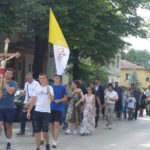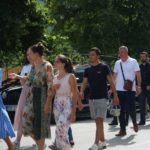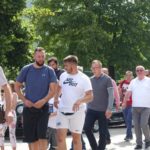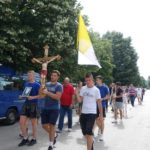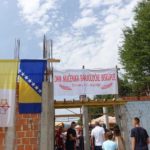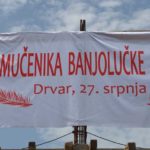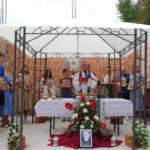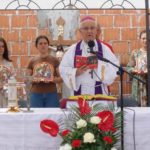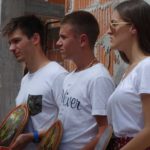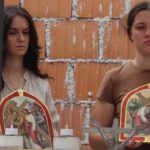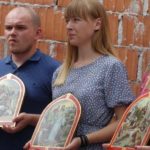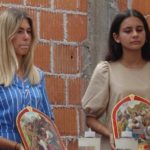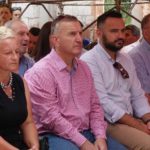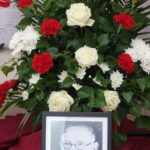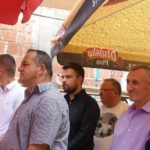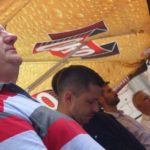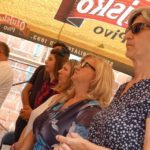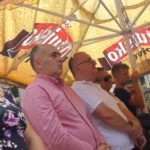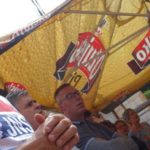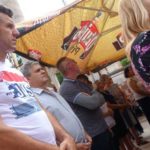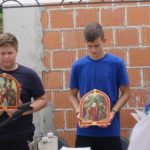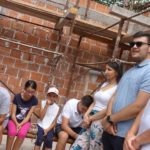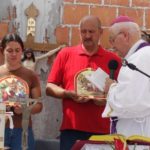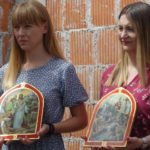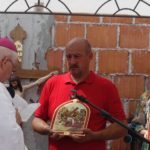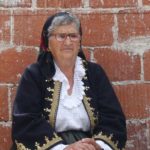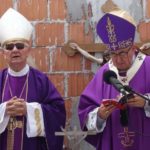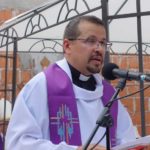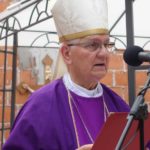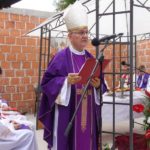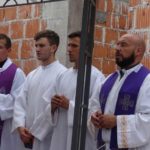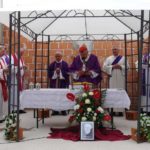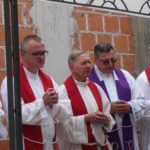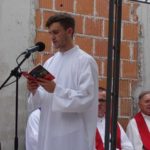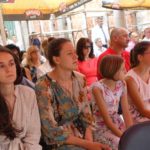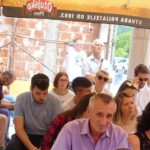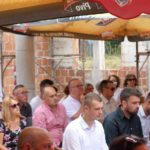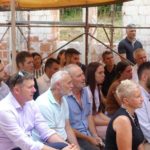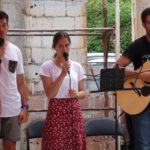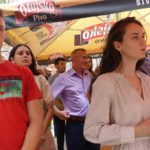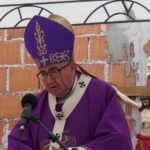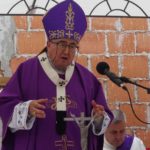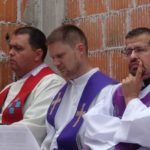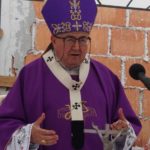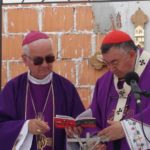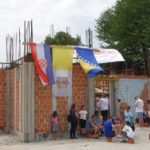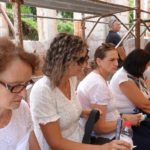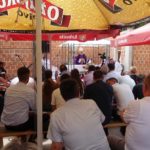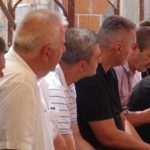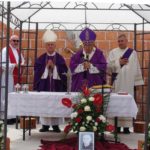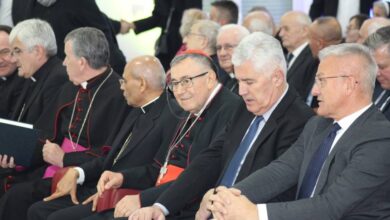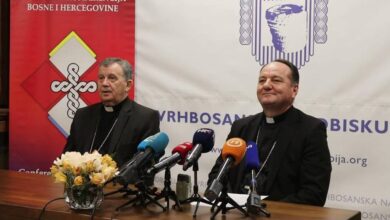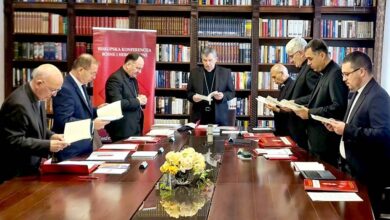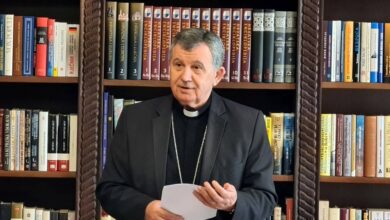MEMORIAL FOR THE MARTYRS AND VICTIMS OF THE BANJA LUKA DIOCESE AND THE PARISH PRIEST NESTOR
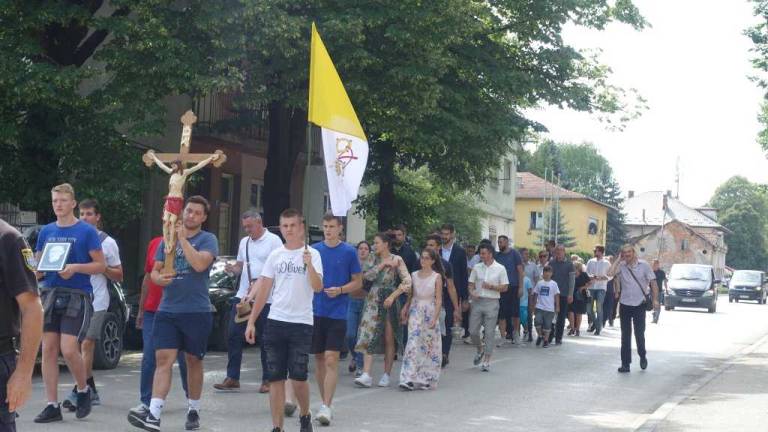
On July 27th, in Drvar, for the 20th time, the “Day of Prayerful Remembrance of the Martyrs and Victims of the Banja Luka Diocese” and the 80th anniversary of the suffering of Pastor Waldemar Maximilian Nestor and Drvar Catholics were marked. The Holy Mass was led by cardinal Vinko Puljić.
Along with the Archbishop of Vrhbosna, in the pastoral centre which is under construction, the Bishop of Banja Luka Franjo Komarica and about 10 priests, including the Vicar General of the Vrhbosna Archdiocese Slađan Ćosić, concelebrated, and the permanent deacon Marijan Krajinović served. More than 100 believers participated, both those from Drvar and pilgrims from different parts of BiH and Croatia. Also present was the Prime Minister of the HBŽ, Ivan Vukadin, with ministers and political representatives of Croats.
Slaughter of the innocent as the day of the uprising
At the beginning of the Holy Mass, the parish priest of Drvar, rev. Davor Klečina briefly presented the suffering of the Catholic Church and the Croatian people in the area of western Bosnia and eastern Lika, which began in the Second World War in 1941 on the date of July 27th with the murder of the parish priest of Drvar, rev. Waldemar Maximilian Nestor and the pilgrims, and it culminated in the following days and weeks. That date was celebrated in the former Yugoslavia as the Day of the Uprising of the Peoples of Croatia and Bosnia and Herzegovina. Pastor Klečina pointed out that the historical fact is that by the end of the Second World War, the Catholic Church and Croats were literally eradicated from that wide area – from Ključ to Knin, and from Livno to Bihać and Gospić.
He also reminded that with rev. Nestor two of his colleagues from the neighbouring parishes were also killed: rev. Juraj Gospodnetić from Grahovo and rev. Krešimir Barišić from Krnjeuša, who were, as he said, first martyred priests at the head of a large column – more than 600 priests, monks, nuns, theologians and seminarians who were killed in World War II and the postwar period in the former state.
Strategic goal: the disappearance of Croats
In his sermon, Cardinal Vinko pointed out that “it is shocking to be here today and to remember everything that happened 80 years ago”. He said he read a history book a few days ago that talks about Catholics from Turkish times. “I found out how many parishes and monasteries disappeared then, even in this region called Bosnian Krajina. However, the seeds did not go out, so after the Turkish times, people lived there again as Catholics”, said the cardinal, emphasizing that it was difficult during the old Yugoslavia when the state police created problems for Catholics who had no one to turn to.
“Unfortunately, this tragic moment came 80 years ago when the faithful went on a pilgrimage and, on their return, perished together with the priest Nestor and were thrown into a pit. It was covered with silence and for 80 years that day has been celebrated. The killing of innocent people is celebrated and you must not talk about it. It is clear that turbulent feelings are aroused in a person”, pointed out the Archbishop of Vrhbosna and reminded of Jesus’ words, who said that his followers would be persecuted.
He then mentioned that a dozen parishes disappeared in the Banja Luka diocese during the Second World War. “We complain that many monasteries disappeared during the Turks, and then after the ‘liberation’ so many parishes were destroyed”, said the Cardinal, recalling that at the beginning of the last war the strategic goal was the disappearance of Croats.
He further added that the truth was not allowed to be told during communism. “Now, after the last war, only the stronger have the right to the truth, and the small must remain silent. You have no right to tell the truth, you have no right to say that you are in pain, that you are disappearing”, he pointed out and recalled that he once talked to a European official, a foreigner who assured him that there had never been a church in Drvar. He explained that this awkward conversation, after the cardinal’s fierce reaction, went so far that the foreigner at one point asked “why do Catholics even need a church”. Following this, the archbishop added that it is difficult to preserve the balance of spirit and hope “even today when some will celebrate the evil that has been done”. He then emphasized that many, who received the vote of their Croatian people, today do not work in their favour, but keep their position and chair, and the people can have it as it is.
“It is not easy to be a prophet in these times and to stand up for the truth. We must not be silent. We do not spread hatred. To speak the truth does not mean to spread hatred because without the truth there is no reconciliation. There is no reconciliation without justice”, he said, noting that without justice, hatred will grow.
Touching on the topic of human rights, he said that they were great “on paper, but in practice there are always more rights for stronger and richer” and added that despite everything, Catholics must swim against the current for Christ who is the Way, Truth and Life.
He further explained the reasons for the gathering in Drvar. “That death of our predecessors, who were killed innocently, is our endowment for us to continue living on those bones. Thanks to the fact that they laid down their lives, we live”, he said at the end of the sermon and told the story of a mother who encourages a captive son who will be deported to Goli Otok to remain faithful and brave despite all trials and tribulations, and to proudly hold his head up high because she trusts him more than “the thieves who imprisoned him”. Therefore, he said that it is right: not to do evil, to wish well, to pray to God in order to persevere on the right path.
Drvar is a first martyr parish
At the end, bishop Komarica expressed his words of gratitude, emphasizing that the reason for gathering in Drvar was the prayerful, penitential and grateful gathering of believers and collaborators of Jesus Christ, who is the Truth. Explaining that Drvar is the first martyr parish of the Banja Luka diocese, which was most destroyed among the Catholic dioceses with the Croatian population during the 20th century, he reminded that 80 years ago “the terrible devil’s deed began and was carried out by poor devil servants”. “For 20 years, we, as a diocesan community, have been celebrating in all our parishes in prayer, penance and repentance, on today’s past day, the beginning of the Golgotha suffering of our diocese, its faithful and priests”, said Msgr. Komarica repeating that the truth had been suppressed for too long, but it could not be killed.
Also, the parish priest Klečina thanked those present, especially emphasizing the role of young people, members of the community Nanovo rođeni from Zagreb who sang and read Holy Mass readings.
The Eucharist was followed by a gathering of those present at the family table, and, among other things, a few patriotic songs were sung by the poet from Knin, Ante Nadomir Tadić Šutra.
Prayer for the dead interfered by communist noise
The prayer program began in front of the memorial cross at the temporary prayer space in Drvar with the welcoming of pilgrims from Trubar – the place where the Chetnik insurgents in 1941 took out of the train Drvar parish priest Waldemar Maximilian Nestor with a group of Catholics returning from the pilgrimage to St. Anne in Kosovo near Knin, they killed them and threw them into the Golubnjača pit.
There, bishop Franjo prayed for all the fallen veterans and wreaths were laid. While the faithful were praying, partisan and communist songs of the “insurgents” were heard from the nearby park, which did not sway Catholics to continue their prayer walk with dignity in the procession to the site of the pastoral centre under construction where Holy Mass was celebrated.
Before the Holy Mass, the devotion to the Way of the Cross of the Martyrs was performed, led by the Bishop of Banja Luka.
This memorial day was introduced in 2001 and was called the Day of the Martyrs of Drvar – in memory of the Drvar parish priest Nestor and the faithful who were brutally killed on July 27th 1941, and since 2008, by order of the Bishop of Banja Luka, Msgr. Franjo Komarica, the commemoration changed its name to the Day of Prayer Remembrance of the Martyrs and Victims of the Banja Luka Diocese, and thus becomes a diocesan commemoration.
KT
www.nedjelja.ba
Drvar – July 27, 2021
